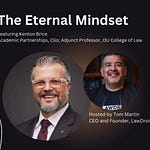Hey there Legal Rebels! 👋
I’m excited to share with you the seventh episode of the 2025 season of the LawDroid Manifesto podcast, where I will be continuing to interview key legal innovators to learn how they do what they do. I think you’re going to enjoy this one!
If you want to understand how power imbalances and lack of workplace protections in the judiciary harm young lawyers, and how technology can drive accountability in traditionally opaque institutions, you need to listen to this episode. Aliza Shatzman has transformed the clerkship landscape through an innovative legal tech platform that exposes judicial misconduct and empowers law students to make informed career decisions.
Breaking the Silence: Revolutionizing Judicial Accountability in Law Clerkships
Join me as I interview Aliza Shatzman, founder of the Legal Accountability Project and trailblazing advocate for judicial reform who won multiple categories at the American Legal Technology Awards.
In this powerful podcast episode, Aliza shares her personal experience with judicial misconduct and how it drove her to create the first-ever transparency platform for law clerks. She reveals the systemic issues within the judiciary, including the shocking lack of workplace protections and the culture of silence that enables abuse. Aliza discusses how her organization's innovative database is revolutionizing the clerkship landscape by giving law students unprecedented insight into judges as managers.
Her story illustrates how technology can pierce institutional opacity and drive accountability in the legal system. This episode is a must-watch for law students, legal professionals, and anyone interested in understanding how innovative solutions can transform deeply entrenched power structures within our justice system.
The Skinny
In this eye-opening episode, Aliza Shatzman shares how her negative experience as a judicial law clerk led her to found the Legal Accountability Project, the first nonprofit dedicated to ensuring positive clerkship experiences. After facing harassment and retaliation during her own clerkship, she discovered that judicial employees lack basic workplace protections. This revelation sparked her mission to create unprecedented transparency in the judiciary through an innovative legal tech platform.
Key Takeaways
Federal judicial employees are exempt from all anti-discrimination laws, including Title VII protections, leaving law clerks vulnerable to harassment and retaliation
The Legal Accountability Project's database functions like "Glassdoor for judges," with nearly 1,500 reviews of over 1,000 judges, democratizing previously hidden information
Law schools often prioritize clerkship placement numbers over student wellbeing, sometimes knowingly sending students to work for abusive judges
Internal reporting mechanisms within the judiciary are largely ineffective, with fewer than five law clerk complaints filed per year despite widespread issues
The federal judiciary has consistently opposed oversight and reform efforts, including recent legislation that would extend workplace protections to judicial employees
The project charges students $40 for annual access to the database, ensuring independent operation without relying on law schools or the judiciary
Notable Quotes
"The federal judiciary is exempt from all anti-discrimination protections - Title VII of the Civil Rights Act of 1964, the Americans with Disabilities Act, the Rehabilitation Act, paid family leave, union organizing... everything, everything. They're exempt from basically all laws." - Aliza Shatzman (15:32-15:49)
"We have democratized judicial clerkship information. We have upended the clerkship system and replaced the really dangerous clerkship whisper network." - Aliza Shatzman (32:30-32:44)
"There is no greater power disparity in the legal profession right now between that of a life tenured federal judge and a fresh out of law school judicial clerk in their first job, totally dependent on that judge for references and career advancement." - Aliza Shatzman (15:02-15:19)
"LAP has no misaligned incentives. I have no ulterior motive. My motive is ensuring that you as a law student go into a positive clerkship experience." - Aliza Shatzman (51:49-52:01)
"The only way to change the system is if every single one of you says no to abuse and says, I'm going to demand better for myself and for my peers." - Aliza Shatzman (52:30-52:43)
Clips
LAP’s Strategy for Providing Honest Clerkship Information
Clerking Under an Abusive Judge
Culture of Fear and Silence in Judicial Misconduct
Judicial Law Clerks Exempt from Anti-Discrimination Laws
Mission Driven by Accountability
The Legal Accountability Project represents a crucial step toward reforming a system that has long operated without meaningful oversight or accountability. Through technology and transparency, Shatzman is empowering the next generation of legal professionals to make informed decisions about their careers while building pressure for systemic change in the judiciary. Her work demonstrates how innovation can help address deeply entrenched power imbalances in our legal institutions.
Closing Thoughts
What Aliza Shatzman has built with the Legal Accountability Project is truly remarkable. While judicial clerkships have long been viewed as prestigious career stepping stones, she's exposed the dangerous lack of protections for clerks and created a concrete solution through technology.
Her work shows how innovation can pierce through institutional opacity and drive real change. By democratizing information about judges through her database platform, she's not just helping individual law students make better career decisions - she's building pressure for systemic reform of the judiciary.
Most inspiring is how Aliza transformed her own negative experience into positive change for others. Rather than being silenced by retaliation, she built an independent platform that gives voice to those who previously had none. Her efforts to bring accountability to one of our most powerful institutions demonstrate the critical role legal technology can play in advancing justice.
The Legal Accountability Project stands as an example of how thoughtful innovation, combined with unwavering mission focus, can begin to shift even the most entrenched power dynamics. For anyone interested in how technology can drive institutional change, Aliza's work provides an inspiring blueprint.
By the way, as a LawDroid Manifesto subscriber, I’d like to invite you to an exclusive event…
What: LawDroid AI Conference 2025
Day 1 - 7 panel sessions, including top speakers like Ed Walters, Carolyn Elefant, Bob Ambrogi, and Rob Hanna—they’re well familiar with how to harness AI as a force multiplier.
Day 2 - It will also feature 3 hands-on workshops from AI experts and demos from over a dozen legal AI companies where you can discover the latest and greatest technology to get you ahead.
Where: Online and Free
When: March 19-20, 2025, 8am to 5pm PT
How: Register Now!
Click here to register for free and secure your spot. Space is limited. Don’t risk being left behind.
Cheers,
Tom Martin
CEO, LawDroid
P.S. Check out the Day 1 & Day 2 schedule—packed with panels, workshops, demos, and keynotes from the industry’s leading experts.













